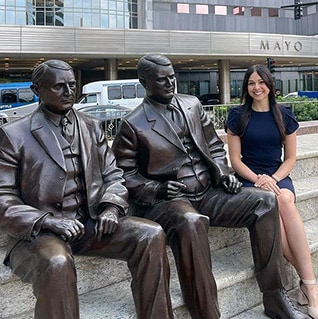Mayo Clinic Graduate School of Medical Education has more than 2,000 residents and fellows enrolled in programs across the country. Of its 300-plus programs, 201 are accredited by the Accreditation Council for Graduate Medical Education, which accredits core specialties and most subspecialties. Ninety-five percent of Mayo's graduate medical education training programs are above the national average in board passage rates.
/prod01/channel_2/media/mccms/content-assets/about/news/aug-oct-2024/1024X512_GME-new-residents-hallway-WF3411007_0016.jpg)
September 10, 2024
More than 600 future physicians recently began training at Mayo Clinic School of Graduate Medical Education. Learn about the school and two of the physicians beginning their professional journeys at Mayo.
Mayo Clinic recently welcomed its newest class of residents to Mayo Clinic School of Graduate Medical Education. More than 600 trainees joined one of the nation's oldest and largest institutions of graduate medical education, specializing in more than 300 programs, including internal medicine, general surgery, dermatology, radiology and more.
Mayo's residents see patients, conduct research, and manage quality improvement projects. They represent the future of healthcare at Mayo Clinic — more than half of the institution's consulting physicians completed some or all of their residency at Mayo Clinic Graduate School of Medical Education.
/0x0:512x512/prod01/channel_2/media/mccms/content-assets/academics/residencies-and-fellowships/512X512-Annie-Sadosty-Dean-GME-1444760_3655672_0021.jpg)
At Mayo Clinic, our mission in graduate medical education is to cultivate the physician leaders of the future. We are privileged to train a diverse group of brilliant and compassionate individuals who have chosen Mayo Clinic to help them realize their aspirations through exceptional training. Our residents and fellows are integral to our work, and we deeply appreciate their dedication, skills, camaraderie, and professionalism.
Annie Sadosty, M.D.
Dean, Mayo Clinic School of Graduate Medical Education
Creating a curriculum for residents' success
The Internal Medicine Residency in Rochester, Minnesota, is the largest residency program at Mayo Clinic, with 180 trainees. Program director Carrie Thompson, M.D., does not take her responsibility lightly.
Dr. Thompson was once in the shoes of her new residents — she came to Mayo in 2001 for her residency and stayed for a hematology and oncology fellowship. Her experience was phenomenal, she says, and when she returned to Mayo as a faculty member, she quickly joined the selection committee for new residents.
Entering her fifth year as head of the program, Dr. Thompson says that running the large Internal Medicine Residency Program presents some challenges but also many opportunities.
"We have the ability to influence the younger generation of physicians, and I love supporting them on their journey," she says.
That support begins as soon as the residents arrive, with a two-week orientation designed to help them transition to life as first-year residents, learn about the Mayo Clinic Model of Care, and meet with the chief residents, among other activities. As they progress through their training, residents in Dr. Thompson's program have resources to help them excel.
Every resident is assigned to an associate program director who acts as their academic mentor. They can participate in a robust research mentorship program with a faculty member that includes protected research elective time. The results speak for themselves: Internal medicine residents in Rochester boast an average number of 4.8 research publications, according to Dr. Thompson's internal data.
Unique experiences don't stop at the research level. Dr. Thompson's residents, together with leaders and faculty supervisors, staff a continuity clinic serving about 14,000 patients in Olmsted County, Minnesota. It's a great way for residents to learn multidisciplinary care and to collaborate across divisions, says Dr. Thompson. It also allows the clinic patients to get to know the residents as their healthcare providers during their years of training.
Rachel Neff, M.D.: A privilege to be here
 One-of-a-kind experiences and opportunities were part of what drew Rachel Neff, M.D., to Rochester's Internal Medicine Residency Program — along with the culture she knew Mayo Clinic School of Graduate Medical Education offered.
One-of-a-kind experiences and opportunities were part of what drew Rachel Neff, M.D., to Rochester's Internal Medicine Residency Program — along with the culture she knew Mayo Clinic School of Graduate Medical Education offered.
"As a medical student at Mayo Clinic Alix School of Medicine, I felt so cared about and so supported," she says.
During her undergraduate education, Dr. Neff worked in Kenya with a nonprofit to develop a local clinic and give mobility carts to patients who had lost the ability to walk. She was inspired by the concept of involving community members in their own health in a sustainable way.
Living in Arizona during medical school, Dr. Neff became an avid hiker and took a deeper interest in her own health and nutrition, even developing a selective on nutrition for the medical school with a fellow medical student.
When Dr. Neff and her husband, Jacob Dunlap, M.D., decided to pursue their residencies in the same place, they interviewed in Rochester and were touched by the extra care that the program director took to meet with them as a couple, the only program to do so. Mayo Clinic was their first choice on National Resident Match Day.
In addition to training in internal medicine, Dr. Neff is interested in pursuing preventive cardiology as a subspecialty. In the meantime, she's excited to be training in a program that is so encouraging.
"Even if I ask a basic question, everyone is happy to answer me with a smile on their face," she says. "It's such a supportive environment. It feels like a huge privilege to be here, and I couldn't be happier."
Nissiya Adjei: Following family ties
 For Nissiya Adjei, M.D., family ties to Mayo Clinic made it her top choice for medical training. Dr. Adjei was born in Rochester and her father completed a gastroenterology fellowship at Mayo in the 1990s.
For Nissiya Adjei, M.D., family ties to Mayo Clinic made it her top choice for medical training. Dr. Adjei was born in Rochester and her father completed a gastroenterology fellowship at Mayo in the 1990s.
"People at his practice and throughout the community have always looked up to him, and I know that his time at Mayo Clinic shaped who he is as an outstanding medical provider," she says.
She attended an Ivy League medical school before setting her sights on Mayo Clinic's Internal Medicine Residency Program in Rochester. Drawn to what she calls the intimate nature of medicine — getting to hear people's heartfelt personal stories about their health — Dr. Adjei knew her program and the faculty would help her throughout her training and support her goals.
"Since beginning my residency, I've been able to reach out to mentors who share my interests as well as some of my spiritual goals," she says. "The program emphasizes that we're all here as part of a team and that it's important to rely on our fellow residents throughout our training."
Dr. Adjei has experience researching women's health issues, specifically racial outcomes in infertility and seeing how providers can ensure that patients who identify as minorities are receiving equitable care and attention. She plans to continue researching such topics with the support of her Mayo faculty mentors and says she may be interested in becoming part of the faculty herself someday.
She's come to the right place.
"Graduate medical education is incredibly important to the mission of Mayo Clinic because we're training our future staff and leaders," says Dr. Thompson. "It's key for us in the Education shield to recruit those who will be excellent physicians and train them in Mayo's values."